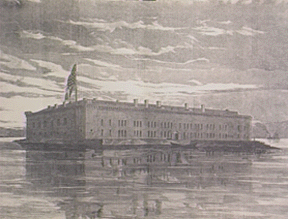Major Anderson “Patient” during Star of the West incident; South Carolina decides against Commandeering the Marion (After Starting to Saw It Up; but It Was Refurbished)
From The New-York Times January 19, 1861:
THE CONDITION OF FORT SUMTER.
The steamer Marion, Capt. ADKINS, vice Capt. SAM. WEITING [WHITING?], arrived at this port yesterday morning, from Charleston, S.C., with some 350 tierces of Rice and a quantity of Cotton. The Marion came out of Charleston Harbor through Maffit’s or Sullivan’s Island Channel, the approach to the main ship channel having been obstructed by the sinking of three or four vessels on the bar, to prevent the entrance of vessels.
Among the steerage passengers of the Marion were four laborers, who were discharged, with four others, from Fort Sumter, on the 11th inst. The other four remained in Charleston. One of those persons took passage yesterday eastward on one of the found boats, while the other three have scattered to parts unknown. From the limited information which can be obtained from these laborers, it appears there are still twenty-five workmen employed at Fort Sumter, and there are about eighty persons, officers and men all told, in Maj. ANDERSON’s present force, exclusive of the laborers.
There appears to be no lack of provisions — at least the workmen always obtained their full rations, but their impression is, that there is but a limited supply of fuel on hand, the rubbish of the fort supplying their present demands for cooking, etc. Owing to the prohibition of all intercourse with Charleston, salt provisions are the only kind which have been dispensed within the fort for about three weeks, but, with few exceptions, both the workmen and soldiers have endured their deprivation of fresh meat without complaint, considering their sufferings as a necessary incident of their position. The entire garrison were in the best of spirits, but a little impatient at the inaction to which they are subjected.
During the approach of the Star of the West, and the firing upon her from Morris Island, Maj. ANDERSON ordered the ports fronting Fort Moultrie and Morris Island to be opened, and the guns were unlimbered. As the firing continued, one of the Lieutenants who commanded a heavy gun entreated Maj. ANDERSON to let him “give ’em just one shot.” “Be patient,” was the only reply from the Commander, who remained in the look-out, with glass in hand, intently watching the approaching steamer.
How long Maj. ANDERSON had determined in his own mind to “be patient,” he alone can tell; but just at what appeared the critical juncture, when every instant the order to ” fire” was expected, the Star of the West was observed to suddenly port her helm, and swinging with her head seaward, doubled upon her track and proceeded out over the bar.
The rumor that there had been mutiny discovered within the fort is wholly denied by the workmen.
The Marion, during the twenty-four hours she was in the hands of the South Carolina authorities, was boarded by crowds of persons, who discussed her fitness for war purposes, there being a great variety of opinions as to how well she would stand the broadsides of an enemy’s ship, Twelve carpenters were set to work to remove the hurricane deck, the intention being to leave only the midship portion which protected the engine. The starboard side was sawed half across, just abaft the pilot-house, and augur holes were bored on the opposite side to introduce a saw to finish the work. The iron and brass which protected the forward hatchway were also removed, and the coverings were about being ripped up, preparatory to planking over the hatch to make a flush deck on which to work the guns. About half of the stateroom partitions in the after-house were taken down, with a view of removing all the after portion of the deck cabin, when word came to suspend operations.
Two hours later it was announced that the vessel had been returned to her owners, and under the direction of the “Lieutenant” the same mechanics proceeded to repair the mischief they had done. In justice to them it must be said that this work of restoring the vessel to her original state was accomplished in a creditable manner, and she does not appear any the worse for having fallen temporarily into the hands of the Philistines.
The Marion is to return to Charleston again on her regular day, though, owing to the great falling-off in the direct freighting business to that port, the expenses of the ship can hardly be paid.
The steamers to Savannah, on the contrary, are now going full of all kinds of merchandise, much of which is Intended for Charleston. Freights on the railroad are good, but prices in Charleston are “excelsior.”
The entire article is also at The New York Times Archive.
Captain Whiting has been in the news lately. South Carolina’s version of Big Brother had written him a letter asking him if the U.S. or South Carolina flag was flying when the Marion left port in late December. You can read the report and Captain Whiting’s reply here

